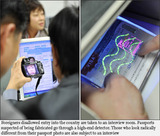
2010-05-07
By Park Si-soo
INCHEON ― An immigration officer at Incheon International Airport heard a slight trembling in the voice of the 44-year-old Vietnamese man despite his efforts to look calm.
Arriving at the airport at 5:46 a.m. on April 23, the Vietnamese man said the purpose of his visit was to meet his daughter who lives here with her Korean spouse. As questioning continued, he showed a replica of ID cards of his so-called daughter and son-in-law, adding that they ``invited’’ him.
His passport and visa were genuine and the background check was clear. But a series of contradictory answers to questions about family issues with his ``daughter’’ made him a bit suspicious in the eyes of the immigration officer. And it was eventually discovered that all of his testimonies to the official were entirely false. He was deported back to his home country.

Some 600 immigration officers at the nation’s largest airport in Incheon, 70 kilometers west of Seoul, engage in such interactions all year around and it’s becoming more intense.
In addition, the level of corruption has evolved and more sophisticatedly-doctored passports and visas by tech-savvy manipulators, especially from China and Thailand, are providing ever-advancing ways for an undetected entry into Korean territory, no matter what their purpose may be.
This year, the G-20 summit will be held in November in southern Seoul and it will require staff to be extremely alert in immigration check-ups. Many heads of state and high-ranking officials from the 20 advanced and emerging economies are expected to set foot on domestic soil via the airport.
Han Hyo-keun, director general of Incheon International Airport Immigration Office, is fully aware of how critical his office’s role is for the country’s successful hosting of the event and pledged to do ``thorough and meticulous’’ immigration checkups to screen all factors that could pose a threat to the summit.
``The top priority of immigration is thoroughness and accuracy,’’ Han said in a recent interview with The Korea Times at his office in the huge airport, through which 25.3 million people traveled in and out of the country last year alone. Of them, 10.27 million were foreign nationals, statistics showed.
``Any disruption to the upcoming summit could jeopardize the country’s international reputation. As a major gateway into the country, we are making all-out efforts to block any uncertainty in security from the outside.’’
Questions over the thoroughness of the current immigration checks have been raised since the capture of two Pakistani men last month, who were suspected of being members of the Taliban. It remains uncertain how they entered the country and what the purpose of their presence here was, but their apprehension by police was clear proof that there is a loophole in the immigration procedures.
``We are armed with an up-to-date screening system, but it doesn’t necessarily mean our system is perfect,‘’ he said, adding, ``That’s why we should introduce a new system that mandates foreign travelers to have their fingerprints scanned and faces photographed at immigration checkpoints as early as possible.’’
``If introduced,‘’ the 57-year-old explained, ``our capability of screening out suspicious figures will notably increase.’’
Just days after the interview, a package of bills aimed at toughening the immigration process, including the fingerprint scanning and face photographing, was endorsed by the National Assembly and will be enforced beginning in August.
Under the new law, all foreign travelers entering Korea ― aged 17 or over ― will have their fingerprints scanned and faces photographed at international airports and harbors. Diplomats and those traveling on official duty will be exempt.
To human rights advocates who see these measures as an act of privacy infringement, he stressed it would be ``advantageous to foreigners’’ than discriminatory against them.
``In the long run, the system will make the country much safer to travel to than now because it will play a great role in blocking illegal entry,’’ he said.
At present, eight countries ― the United States, Japan, France, Italy, Spain, Hong Kong, Singapore and Brazil ― require foreign travelers to have their fingerprints registered. Four other countries ― Sweden, the United Kingdom, the Netherlands and Canada ― are expected to follow suit, the Ministry of Justice said.
China, Thailand: Notorious for Passport Fabrication
Though the legal grounds for the full use of the biometric, information-based screening were set forth, enforcement is still three months away. Adding to concerns are the techniques used for passport fabrication which have always advanced faster than countermeasures.
According to the chief immigration official, Thailand and China are highly advanced in fabrication technique development so that his office has regarded suspicious travelers from the two states with extreme caution.
In fact, China ranked first last year in the number of people caught attempting to pass through immigration with forged passports with 675 cases. Thailand was ranked second during the same period with 651. The two countries accounted for nearly half of the 2,676 cases reported throughout 2009.
Han said Thailand’s simple process to change one’s personal information has been taken advantage of to make fake passports.
``If they want, they can change virtually all the data in their passport including their name and even their date of birth. This is legitimate in the southeast Asian state,‘’ he complained. ``Those whose entry to Korea was denied due to wrongdoings at home and abroad attempted to change their personal information and then tried to pass through immigration with a new passport.’’
It has long been a headache for Korean immigration authorities, but he said it recently found how to cope with it.
``There is one thing that cannot be changed, a sort of social security number,‘’ he said. The office had a tough time obtaining the highly confidential information from the Thai government. ``No matter how sophisticatedly modified a Thai passport may be, we are capable of distinguishing it and nabbing the conspirator.’’
He declared it a step toward a ``perfect’’ immigration system, but added ``We still have a long way to go.’’